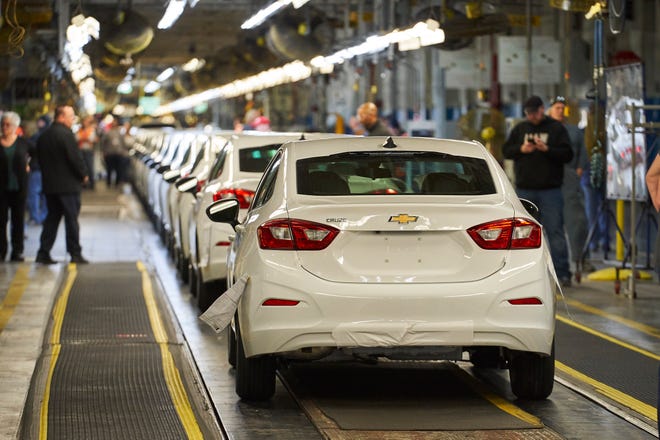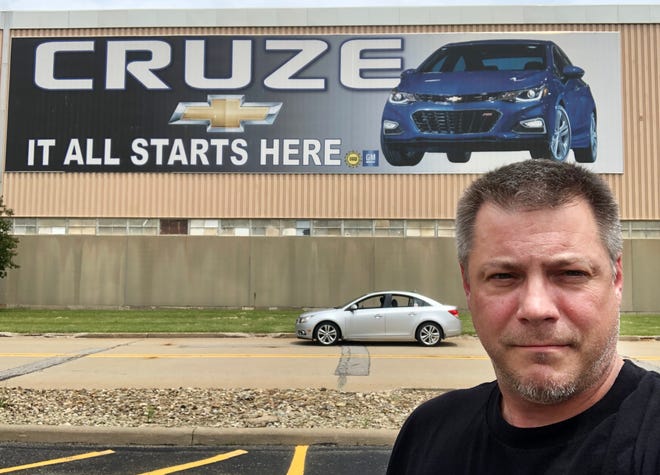The hourly workforce at Ultium Cells LLC, the joint venture owned by General Motors and battery maker LG Energy Solution, has voted to unionize its plant in northeast Ohio after the union and the company spent months at odds over the organizing process.
About 1:30 Friday morning, the UAW released the results of a two-day vote that started Wednesday and ended at 11 p.m. Thursday. The workers at the plant, located near GM’s former Lordstown Assembly plant in Ohio, voted in favor of joining the UAW by a vote of 710 to 16, the UAW said.
Experts say the victory is significant for the UAW’s future. It should enhance the UAW’s bargaining power with the Detroit Three automakers later next year, for example, and it signals that Ultium’s two other plants — one being built in Spring Hill, Tennessee, and the other in Lansing — will likely also vote yes for union representation.
“If the UAW draws the important lessons from this win and uses the knowledge to replicate success in other comparable situations of joint ventures, then it will have performed its mission well,” said Marick Masters, a professor of business at Wayne State University and an expert on unions. “The ultimate objective of unionizing is to improve the working conditions of people and build a stronger middle class. This victory is another signal that there is considerable support for unions that can result in bargaining representation if workers are given a fair chance to exercise their voice without undue employer interference.”

The results are also fairly predictable, said another union expert, considering the factory’s location. The Ultium factory is near the factory where GM once built the Cruze subcompact car until 2019 when the automaker closed it down and, later that year, sold it to electric truck maker Lordstown Motors.
“Lordstown is die-hard UAW country, so the surprise is that 16 voted ‘no,’ ” said Erik Gordon, business professor at Ross School of Business at University of Michigan. “If the UAW had lost there, it would have signaled the end of the union. Lansing also is UAW territory. UAW wins in traditionally union territory shows that the UAW remains important to workers who were born pro-union.”
GM welcomes a union, Barra said
A person close to GM leadership told the Free Press on Thursday that the automaker expects there will be union representation at each of the Ultium Cells plants it’s building given where the company chose to locate them. The person declined to be named because the comment was not authorized to be given to the media.
All three Ultium plants will be near GM assembly plants, which are already union-represented. Ultium will build a fourth factory in North America, that location has not yet been announced, but as the Free Press reported in August, the company is considering New Carlisle, Indiana, which is a few miles south of the Michigan border and about 15 miles west of South Bend, Indiana.
In a statement Friday, UAW President Ray Curry said, “Our entire union welcomes our latest members from Ultium. As the auto industry transitions to electric vehicles, new workers entering the auto sector at plants like Ultium are thinking about their value and worth. This vote shows that they want to be a part of maintaining the high standards and wages that UAW members have built in the auto industry.”
GM spokesman Dan Flores released a statement Friday after the vote saying, “Ultium Cells is an important supplier to GM and for our EV future. We are hopeful that Ultium Cells and the UAW can successfully establish a competitive and flexible labor agreement that helps ensure the future success of Ultium Cells’ business.”

Ultium Cells spokesperson Brooke Waid provided the following statement Friday: “We have received election results from the National Labor Relations Board (NLRB), and respect the decision of our Ohio workforce supporting representation by the UAW. We look forward to a positive working relationship with the UAW.”
GM CEO Mary Barra told reporters Thursday that she supports the union and noted that her father, Ray Makela, was a tool and die maker at GM’s former Pontiac plant and she started at the factory there at age 18 as a co-op student at Kettering University. She said, if approved, she would want to nail down a new contract with the UAW for Ultium as soon as possible.
“We’re a company that’s worked with unions around the world for many years, so we welcome Ultium having union representation,” Barra said. “We can work together on things like health and safety, quality training.”
At odds over organizing
Ultium Cells started building battery cells for GM electric vehicles in August, but the union started organizing efforts among the first 500 employees there before that and almost immediately said it had issues with the company over the organizing process.
As first reported by the Detroit Free Press in June, Terry Dittes, then-UAW vice president and director of the GM Department, said in a memo to members that the company’s leaders denied the union the use of a “card check” process, Dittes said.
The “card check” process has long been an issue between the UAW and Ultium Cells, as the Free Press first reported last year. A card check process would allow workers to check a box on cards to organize, versus a drawn-out, traditional vote process. The UAW prefers the simplified process because a vote allows for counter-campaigning that the union views as unfair.
When asked in June whether Ultium “flat-out” rejected the card check process, Ulitum Cells’ Waid said the company had initial discussions around a neutrality agreement and, “We are, and always have been, supportive of the process that allows our people to determine their own representation status, which is a matter of personal choice.”
Given that history, this UAW victory “by an overwhelming margin represents a milestone in its march to organize the battery-production wing of auto manufacturing,” Masters said.
“It bodes well for allied efforts at Ultium, suggesting that the union has a good handle on the issues that motivate workers to want bargaining representation,” Masters said. “From a strategic and tactical standpoint, the victory should increase the bargaining power of the UAW as it approaches the next round of negotiations.”
The Detroit Three automakers will sit down at the bargaining table with the UAW next fall to renegotiate the 2019 contract. When it does, there will likely be new faces at the table representing the union. Last week, UAW members had their first direct election of top leaders. There was no clear winner for the top job, leading to a runoff to determine whether current President Ray Curry will be unseated.
Many reform candidates — those who raised concerns about the union’s corruption scandal and a perceived unwillingness by its leaders to fight hard enough against tiered wages and other concessions — did win spots. One new leader will be Region 2B Director Dave Green, who ran as an independent. Green once served as president of UAW Local 1112, which represented the workforce at Lordstown Assembly plant. Region 2B represents UAW members in Indiana and Ohio. Green said he is not yet sworn in to his new role, so he declined to comment on the Ultium union results at this time. He will be sworn in on Monday.

The UAW credits part of its success in organizing the plant to existing UAW members and retirees at Local 1112.
“Their hard work and the support of Region 2B members and staff have led to this powerful victory,” said current UAW Region 2B Director Wayne Blanchard in a statement. “Special thanks to the retirees of Local 1112 who would open the hall at any hour to help Ultium workers meet.”
Ultium’s other locations and investments
Besides the plant in Lordstown, Ultium is spending $2.3 billion to build a plant near GM’s Spring Hill Assembly plant, where GM assembles the Cadillac Lyriq EV. That battery cell plant will open late next year. A week ago, Ultium said it will invest $275 million more in the plant to boost battery cell production as GM begins bringing more EVs to market.
Ultium Cells is currently spending $2.6 billion to build a plant in Lansing Delta Township to start production in 2024.
The company expects to provide enough battery cells to meet GM’s target to produce 1 million EVs in North America by mid-decade. It will also help GM supply battery cells to other automakers and industries including rail, aerospace, heavy trucking and marine customers. In 2020, GM partnered with Honda to jointly develop two EVs.
Barra said Thursday that UAW representation at the Ultium Cells plants does not automatically mean the joint venture faces a cost disadvantage against nonunion competitors. But she said, “We’ve got to be competitive. We don’t have a right to exist. We’ve got to be competitive to have a company and go forward. We have that conversation with employees on the floor and they get it.”
The U-M’s Gordon agreed, saying, “If unionized battery plants aren’t as efficient as nonunionized plants, the unionized plants won’t survive a transition to the next generation of batteries.”
More:GM’s $45M investment in Indiana plant is critical move in EV future
More:GM: No monthly fee for heated seats, but look for more subscription offerings
Contact Jamie L. LaReau: jlareau@freepress.com. Follow her on Twitter @jlareauan. Read more on General Motors and sign up for our autos newsletter. Become a subscriber.